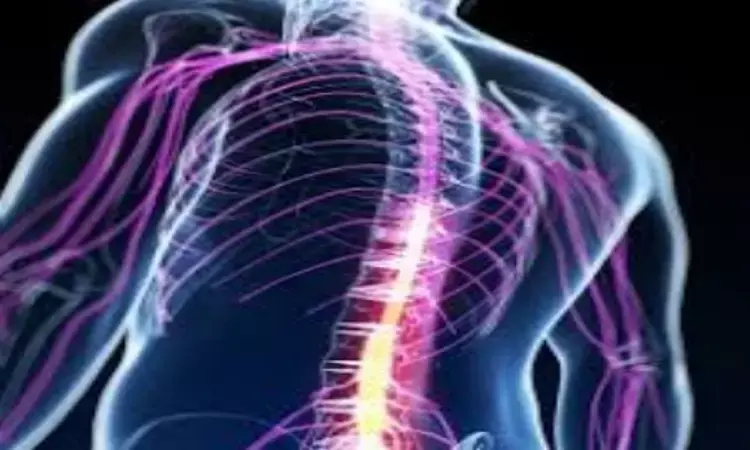- Home
- Medical news & Guidelines
- Anesthesiology
- Cardiology and CTVS
- Critical Care
- Dentistry
- Dermatology
- Diabetes and Endocrinology
- ENT
- Gastroenterology
- Medicine
- Nephrology
- Neurology
- Obstretics-Gynaecology
- Oncology
- Ophthalmology
- Orthopaedics
- Pediatrics-Neonatology
- Psychiatry
- Pulmonology
- Radiology
- Surgery
- Urology
- Laboratory Medicine
- Diet
- Nursing
- Paramedical
- Physiotherapy
- Health news
- Fact Check
- Bone Health Fact Check
- Brain Health Fact Check
- Cancer Related Fact Check
- Child Care Fact Check
- Dental and oral health fact check
- Diabetes and metabolic health fact check
- Diet and Nutrition Fact Check
- Eye and ENT Care Fact Check
- Fitness fact check
- Gut health fact check
- Heart health fact check
- Kidney health fact check
- Medical education fact check
- Men's health fact check
- Respiratory fact check
- Skin and hair care fact check
- Vaccine and Immunization fact check
- Women's health fact check
- AYUSH
- State News
- Andaman and Nicobar Islands
- Andhra Pradesh
- Arunachal Pradesh
- Assam
- Bihar
- Chandigarh
- Chattisgarh
- Dadra and Nagar Haveli
- Daman and Diu
- Delhi
- Goa
- Gujarat
- Haryana
- Himachal Pradesh
- Jammu & Kashmir
- Jharkhand
- Karnataka
- Kerala
- Ladakh
- Lakshadweep
- Madhya Pradesh
- Maharashtra
- Manipur
- Meghalaya
- Mizoram
- Nagaland
- Odisha
- Puducherry
- Punjab
- Rajasthan
- Sikkim
- Tamil Nadu
- Telangana
- Tripura
- Uttar Pradesh
- Uttrakhand
- West Bengal
- Medical Education
- Industry
Study sheds light on role of MRI in management of neuromuscular disorders

Denmark: Muscle MRI may be an important biomarker to monitor change in disease severity and to diagnose neuromuscular diseases, suggests a recent study in the journal Annals of Neurology. This review can help neurologists to better understand the role of magnetic resonance imaging (MRI) in the management and diagnosis of neuromuscular disorders.
Neuromuscular disorders include diseases that affect the peripheral nervous system, which consists of all the motor and sensory nerves connecting brain and spinal cord to the rest of the body.
There is an unmet need for the identification of biomarkers sensitive to change in rare, slowly progressive neuromuscular diseases. This opportunity may be offered by quantitative magnetic resonance imaging (MRI) as it is non-invasive and can be carried out independently of the disease severity and patient cooperation.
Julia R. Dahlqvist, Copenhagen University, Copenhagen, Denmark, and colleagues examined the utility of quantitative muscle magnetic resonance imaging (muscle MRI) in the diagnosis of neuromuscular diseases.
Read Also: Textural analysis in breast MRI improves diagnostic accuracy, finds study
In the study, they discussed muscle features investigated by magnetic resonance imaging, including calculations of fat fraction and lean muscle volume, muscle edema, and fibrosis. They also review MRI changes highly associated with neuromuscular disorders such as Duchenne's muscular dystrophy, Becker muscular dystrophy, limb-girdle muscular dystrophies, and spinal muscular atrophies compared with amyotrophic lateral sclerosis. Furthermore, they discuss the role of MRI in the prognosis of muscular disorders.
"Muscle fat content correlates with muscle function in neuromuscular diseases, and changes in fat content precede changes in function, which suggests that muscle MRI is a strong biomarker candidate to predict prognosis and treatment efficacy," wrote the authors.
"In this paper, we review the evidence suggesting that muscle MRI may be an important biomarker for diagnosis and to monitor change in disease severity," they concluded.
Read Also: Vitamin B3 may delay progression of rare neuromuscular disorder
The study, "MRI in Neuromuscular Diseases: An Emerging Diagnostic Tool and Biomarker for Prognosis and Efficacy," is published in the journal Annals of Neurology.
Dr Kamal Kant Kohli-MBBS, DTCD- a chest specialist with more than 30 years of practice and a flair for writing clinical articles, Dr Kamal Kant Kohli joined Medical Dialogues as a Chief Editor of Medical News. Besides writing articles, as an editor, he proofreads and verifies all the medical content published on Medical Dialogues including those coming from journals, studies,medical conferences,guidelines etc. Email: drkohli@medicaldialogues.in. Contact no. 011-43720751


